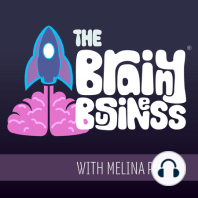47 min listen

286. Beyond 'If Only': Maximizing the Benefits of Counterfactual Thinking (Refreshed Episode)
FromThe Brainy Business | Understanding the Psychology of Why People Buy | Behavioral Economics
286. Beyond 'If Only': Maximizing the Benefits of Counterfactual Thinking (Refreshed Episode)
FromThe Brainy Business | Understanding the Psychology of Why People Buy | Behavioral Economics
ratings:
Length:
46 minutes
Released:
May 9, 2023
Format:
Podcast episode
Description
Counterfactual thinking (when we mentally "undo" events that have already happened and imagine different outcomes) can contribute to personal and professional growth when applied constructively. This type of thinking is closely related to prefactual thinking, which involves imagining future scenarios, alternatives, and opportunities. Both types of thinking can aid in regulating behavior, problem-solving, and goal setting, ultimately contributing to improved performance and success in life and business. This episode highlights the interplay between counterfactual and prefactual thinking and how both can foster unique perspectives and considerations that set individuals and businesses apart from the competition. There is immense value in adopting a curious, open-minded approach when engaging in these thought processes, which can ultimately lead to personal development, innovation, and cultivating a successful and resilient mindset. Here's some of what you'll get from this episode: Explore the intriguing effects of counterfactual thinking on emotions and behaviors. Identify the fine line between helpful and detrimental counterfactual thoughts. Learn effective tactics for managing counterfactual thinking in tough situations. Uncover the power of combining counterfactual and prefactual thinking for a winning strategy. Master transforming negativity into productive and positive actions. Show Notes: 00:00:00 - Introduction, Melina Palmer introduces the podcast episode (a refresh from one that originally aired in October 2019) focusing on counterfactual thinking and how it is central to being human. She explains the different types of counterfactuals and the impact they can have on our emotions and way of thinking. 00:05:06 - Types of Counterfactuals, Melina explains the difference between upward and downward counterfactuals, omissions and commissions, rumination and undoing, and usual or extreme events. She encourages listeners to reflect on their own types of counterfactuals and how they have impacted them in the past. 00:09:25 - Target of Counterfactuals, Melina discusses how the target of counterfactuals can impact the thought process. She gives an example of how people tend to focus on themselves even when they are not to blame, which can lead to distress and anxiety. 00:13:32 - Example of Unhealthy Counterfactual Thinking, Melina provides an extreme example of unhealthy counterfactual thinking where a woman dwells over a nonevent at work and becomes distressed and angry, constantly dwelling over what the woman in HR did or didn't do and how she could have acted differently. 00:14:50 - Recap, Melina summarizes the key takeaways from the episode so far and encourages listeners to use counterfactual thinking as a tool for setting and achieving goals, while also being mindful of when it becomes unhealthy and causes distress. She reminds listeners to download the free counterfactual thinking worksheet (and get more resources) in the show notes. 00:14:57 - The Impact of Counterfactual Thinking, Counterfactual thinking can lead to spiraling thoughts and negatively impact interactions. Dwelling on negatives can be harmful and counterproductive. It's essential to focus on the present and not dwell on the past. 00:19:07 - A Study on Counterfactual Thinking, A study on counterfactual thinking found that over half of the respondents were undoing a traumatic event in their minds. The distress level and frequency of undoing did not differ based on whether the item being undone was usual or exceptional; omission or commission. 00:25:31 - Focus on Self, Those who were undoing the event in their minds were more focused on their own actions or the actions of their loved ones than the other driver's behavior, even though the other driver was (typically) at fault. This shows how quickly the brain can compartmentalize and can lead to feelings of regret, guilt, and responsibility. 00:28:54 - Recency of Undoing, The recency of the undoing process
Released:
May 9, 2023
Format:
Podcast episode
Titles in the series (100)
10. On Air Strategy Planning Session with Mariel Court: In this behavioral economics podcast it is time to apply what I have been talking about in the first 9 episodes through this very first on air strategy session, featuring my guest Mariel Court. Mariel is someone I met in the BizChix Coop (which is... by The Brainy Business | Understanding the Psychology of Why People Buy | Behavioral Economics